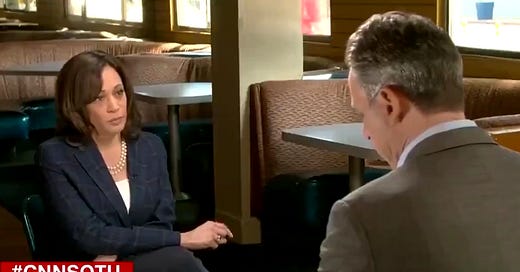Kamala Harris Pushes for Taxpayer-Funded Healthcare for Illegals
Universal healthcare for illegal immigrants? Harris' bold proposal sparks fiscal and ethical debates.
Kamala Harris has publicly supported giving taxpayer-funded universal health care to illegal immigrants. In an interview, when explicitly asked on CNN's State of the Union program about health care for illegals in the U.S., Harris had it that there be no mistaking what she was asserting: "Let me just be clear about this. I do not support any policy that would deny any human being in our country access to public safety, public education, or public health. Period.” While CNN has apparently pulled the video from its website since her stance is not popular with Americans, we have the preserved video here below (click on pic to see:
Kamala Harris clearly states her opinion that illegal immigrants should have access to universal healthcare paid for by the U.S. taxpayer. Again, This kind of thinking fits right into the far-left progressive agenda of following inclusive and compassionate lines versus being logical and realistic about any challenges such policies face.
In my view, Harris' proposal is problematic for a few reasons. For one, it would represent an enormous enlargement of government involvement in healthcare and immigration. Universal health care for illegal immigrants would further expand our budget—taking on more debt to be able to finance such an added expense.
Health reform is not a light issue even for legal citizens since the costs and bureaucratic complications are massive. Extending such benefits to illegal immigrants places a financial strain on the system that is almost sure to have a further negative impact on U.S. citizens to the benefit of illegal immigrants. I would suggest that the result of such an expansion will be high taxes, a rise in the national debt, and possible cuts in the quality of care to U.S. citizens because the healthcare system is overloaded. Fiscal responsibility reigns supreme in this regard, as it indicates that unsustainably high spending does more harm than good to an economy in the long run.
While the humanitarian argument for universal healthcare is compelling, it must be balanced with practicality. So, if you believe in the sovereignty of the individual and personal responsibility—that is, doing what is right or moral—giving benefits to illegal immigrants does them a disservice by setting them up for failure and compounding your costs.
Perhaps rather than expanding the reach of government programs, we should seek to advance market-based solutions in healthcare, like presidential nominee Chase Oliver.
Oliver says, "Healthcare is too expensive because of government overregulation. We need to speak out in favor of market alternatives to the heavily regulated employer-provided insurance model, such as the Direct Primary Care model. We need also to reform how we bring new drugs to market and end such practices as patent evergreening, which keeps the cost of too many drugs artificially high. With more choice and free market forces, we will see the price of health care overall dropped.”
Oliver continues, “I will also urge Congress to remove the limitation on Health Savings Accounts. Right now, these accounts are capped at $4,150 for individuals a year, or $8,300 for families; well below the cost of health care in America, which on average costs $13,493 per person a year. We must lower the regulatory burden on the pharmaceutical industry, which imposes huge costs on research and development that both protects favored firms by erecting costly barriers to entry that crowd out smaller firms and increase the costs of end-products to consumers.”
Harris's stance is unrealistic and a nonstarter in improving our healthcare system, whereas Oliver's position is the best implementation option.
A sustainable approach to healthcare and immigration would be based on reforms that respect individual freedom and the rule of law. In other words, in healthcare, we ensure competitive markets, innovation, and cost control; with immigration, that's by establishing a practical, realistic, and enforceable system so that people come here legally, following American law and values. Ultimately, a free society needs to be compassionate and in equilibrium with pragmatism so that policies are not set to undermine the very foundations of liberty and prosperity. Therefore, as we proceed with this debate, it is instrumental to keep reminding ourselves that the path to real growth is not increasing government power but passing on more power to the people and communities themselves.






